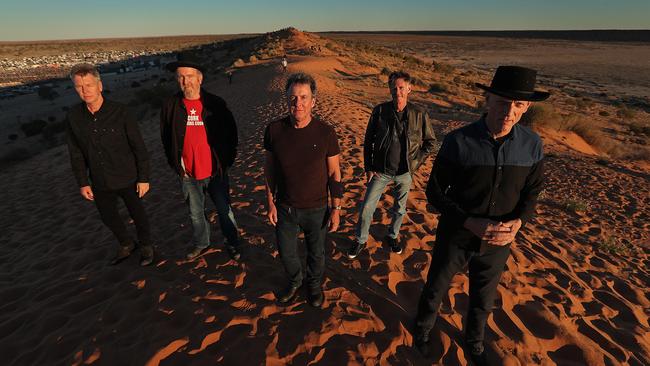Midnight Oil back with passion to the dead heart
Tonight, on the edge of Simpson Desert, Midnight Oil headlines world’s most remote festival.

When Midnight Oil went into the desert 33 years ago in search of a better understanding of indigenous Australia, the experience produced a batch of songs that became the band’s defining and most enduring work.
Tonight, on the edge of the Simpson Desert in western Queensland, against the backdrop of a giant sand dune known as Big Red, the Sydney rock group will headline an event organisers claim is the world’s most remote music festival. It is the final night of the Big Red Bash, near Birdsville, and many of the 10,000 people there will be waiting to hear those Midnight Oil anthems Beds Are Burning and The Dead Heart.
“You have moments where the stars are shining a little brighter in the night sky, where the pulse beats a little more quickly,” singer Peter Garrett said yesterday. “It’ll be one of those nights.”
In July 1986, Midnight Oil went on the road with the Warumpi Band for the Blackfella/Whitefella tour that took them through central Australia and into the Top End. Audiences were sparse and the Oils — describing themselves at the time as “semi-naive white fellas” — realised their raucous city sound was too brash for the desert landscape.
“It didn’t work, and people just left,” said Oils drummer and songwriter Rob Hirst. “We realised there was a different rhythm out there, so we took a leaf out of the Warumpis’ book: we turned down and slowed down.”
Their 1987 album Diesel and Dust — the record that yielded Beds Are Burning and The Dead Heart, and sold in the millions — drew listeners to the conditions of indigenous Australia.
That curiosity and willingness to meet people on country became ingrained in the band’s approach to art and songwriting, and it’s unsurprising that Garrett is an emphatic supporter of calls for an indigenous voice to parliament.
“I think the Uluru Statement from the Heart is a critically important document and expression of the will of First Nations peoples,” he said. “We would strongly support the indigenous voice to parliament.”
Since the Oils reformed in 2017, they have attacked their catalogue with the vigour, musical precision and showmanship usually expected of performers half their age.
With plans afoot to return to the studio later this year, have they found fresh kindling with which to light those angry fires?
“There’s still a lot of frustration and anger about some major things in this country, which come out in our live performances, and no doubt will come out in the new songs,” said Hirst.
Fellow performers on the final night of the three-day event include Kasey Chambers and Steve Kilbey, frontman of The Church.
“How could you compete with Midnight Oil? You can’t — they’re untouchable,” said Kilbey.




To join the conversation, please log in. Don't have an account? Register
Join the conversation, you are commenting as Logout